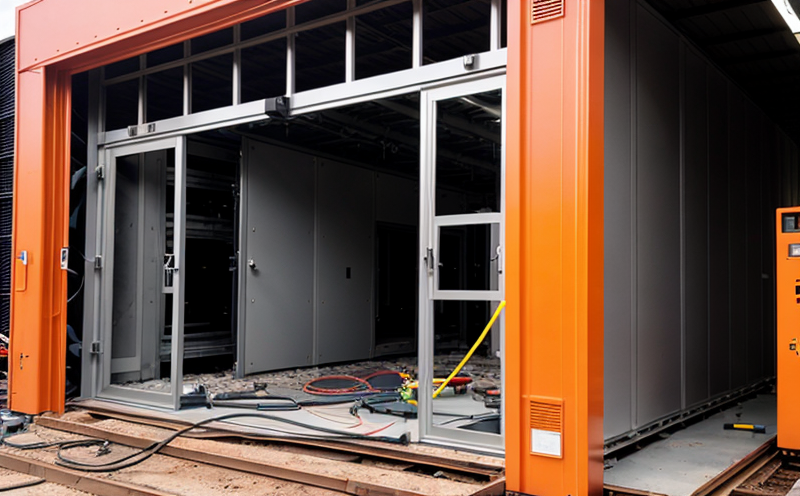ASTM F3117 Thermal Testing of Primary Lithium Cells for Medical Applications
The ASTM F3117 standard is a critical document that sets forth protocols to evaluate the thermal stability and safety characteristics of primary lithium cells intended for medical devices. These batteries are used in various medical applications, including implantable devices, portable diagnostic equipment, and wearable health monitors.
Thermal testing under ASTM F3117 ensures that these batteries can withstand extreme environmental conditions without failing catastrophically. This is essential because a thermal event in a lithium cell could lead to overheating, which might result in fires or explosions. Compliance with this standard helps manufacturers ensure the safety of their products and meet regulatory requirements.
The test involves subjecting the battery cells to controlled thermal environments that simulate real-world conditions they may encounter during storage, use, or transport. The goal is to identify any potential risks associated with thermal stress while also validating the effectiveness of built-in safety features such as pressure relief valves, flame arrestors, and overcurrent protection circuits.
The testing process typically involves placing the battery in an oven set at specific temperature ranges for a defined duration. During this time, various parameters are monitored including voltage, current, internal resistance, and temperature rise. If any parameter exceeds predetermined thresholds, it triggers immediate shutdown of the test to prevent potential hazards.
For accurate results, proper specimen preparation is crucial. This includes ensuring that each cell has been fully charged according to manufacturer specifications before testing begins. Additionally, cells must be conditioned under conditions similar to those expected during real use to ensure realistic performance data.
The ASTM F3117 standard provides detailed instructions on how to perform these tests properly. It specifies not only the temperature ranges but also the rates at which temperatures should change and hold steady. The document also outlines acceptable limits for key measurements like voltage drop across resistance, maximum allowable surface temperature increases, etc.
By adhering strictly to ASTM F3117 guidelines, manufacturers can demonstrate compliance with relevant regulations governing medical devices containing lithium batteries. This not only protects end users but also enhances brand reputation by showcasing commitment to quality and safety standards.
In summary, ASTM F3117 thermal testing plays an indispensable role in safeguarding the integrity of primary lithium cells employed in critical healthcare technologies. Its rigorous procedures help maintain high levels of reliability and reduce risks posed by malfunction or accidental activation due to overheating incidents.
Why It Matters
The importance of ASTM F3117 thermal testing cannot be overstated, particularly when considering the increasing demand for advanced medical devices powered by lithium cells. As technology advances and more sophisticated treatments become available, there is a growing need to ensure that these technologies operate safely and effectively.
- Prevents potential hazards: By identifying weaknesses early through thorough testing, manufacturers can address issues before they lead to accidents or malfunctions.
- Ensures regulatory compliance: Meeting specific standards like ASTM F3117 helps companies navigate complex regulatory landscapes associated with medical device manufacturing and distribution.
- Enhances consumer trust: Demonstrating adherence to recognized industry benchmarks builds confidence among healthcare providers and patients alike.
- Promotes innovation: Rigorous testing encourages continuous improvement in design and manufacturing processes, driving advancements that benefit both manufacturers and end users.
In essence, ASTM F3117 serves as a vital tool for safeguarding public health while fostering technological progress within the medical device industry. Its implementation underscores a commitment to excellence and responsibility towards those who depend on these technologies every day.
Scope and Methodology
The scope of ASTM F3117 is narrowly focused but extremely important for ensuring the safety and reliability of primary lithium cells used in medical applications. According to Section 1, this standard applies specifically to primary lithium cells intended for use in implantable devices, portable diagnostic equipment, and wearable health monitors.
Section 2 details the methodologies involved in conducting thermal testing according to ASTM F3117. Key components include:
- Preparation of specimens: Ensuring each cell is fully charged and conditioned appropriately before testing begins.
- Oven setup: Configuring an oven capable of maintaining precise temperature settings within specified ranges.
- Data collection: Monitoring various parameters such as voltage, current, internal resistance, and surface temperatures during the test period.
Section 3 provides acceptance criteria based on these measurements. Cells failing to meet certain thresholds at any point are deemed unsuitable for medical applications.
The methodology described in ASTM F3117 is designed to be stringent yet practical, balancing thoroughness with efficiency. It requires careful planning and execution but offers valuable insights into the behavior of lithium cells under thermal stress conditions.
Industry Applications
- Implantable Devices: Primary lithium batteries are often used in pacemakers, insulin pumps, cochlear implants, and other devices that require reliable power sources without the risk of overheating or failure.
- Portable Diagnostic Equipment: Lithium cells provide long-lasting power for portable blood glucose meters, ECG machines, and other diagnostic tools. Ensuring their stability is crucial for accurate readings and timely treatment decisions.
- Wearable Health Monitors: Devices like fitness trackers or smartwatches may incorporate lithium batteries to support continuous monitoring functions. ASTM F3117 helps guarantee the safety of these devices during extended periods of use.
- Backup Power Supplies: For critical medical equipment that relies on backup power in case of main supply failure, lithium cells must remain stable even under extreme thermal conditions.
The rigorous testing outlined in ASTM F3117 ensures that primary lithium cells meet stringent safety standards required for use in these diverse applications. This guarantees consistent performance across all devices powered by these batteries.





